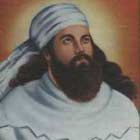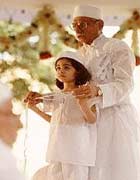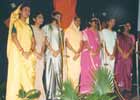Jamshed-I-Navroz is the New Year's day for the Parsi community in India
and is celebrated in the month of March. The Parsis follow the Persian
calendar. This celebration goes back to the time of the King of ancient
Persia, Jamshed, who introduced the solar calendar and is also believed
to have first made wine.
The Parsis who wear new clothes and decorate their homes with rangoli
patterns drawn with metal mpulds and flowers. Sweets are exchanged and
the Parsisi visit the fire-temples making offerings of sandalwood.
The advent of spring in February-March and the vernal equinox - these
are the two events that usher in Jamshed-e-Navroz. The actual time when
the changes take place is noted down in Iran and then the information is
sent all over the world to Zoroastrians.
This festival is mentioned in Shah Nameh, the Persian ‘Book of Kings'
written by Firdausi. According to Firdausi's book, this festival was
celebrated by the kings of Persia, Cyrus and Darius, to rejoice in the
spring and in their own glory.
According to popular legend, the mythical Persian king Jamshed was the
first to celebrate this festival. The Shah Nameh states that the feast
commemorates the ascent of King Jamshed into the skies, in a chariot
built by the demons he had subdued and forced into the service of
mortals.
Named after the king, Jamshed-e-Navroz appears to have been a pagan
pastoral festival that marked the transition from winter to summer. The
rites of fertility and procreation can be perceived in some of its
customs.
Festivals and Fairs |
   |


